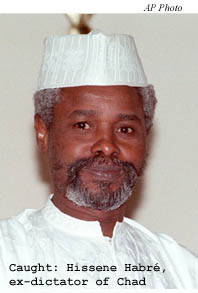Radio France International correspondent expelled
New York, October 23, 2003— The Committee to Protect Journalists (CPJ) is disturbed that Senegalese authorities have refused to lift an October 6 expulsion order against Sophie Malibeaux, correspondent for Radio France Internationale (RFI). At the time, the order was temporarily reversed, but Malibeaux has again been ordered to leave the country. Senegalese authorities accused…
Attacks on the Press 2002: Africa Analysis
Although the Kenya-based East African Standard, one of Africa’s oldest continuously published newspapers, marked its 100th anniversary in November, journalism remains a difficult profession on the continent, with adverse government policies and multifaceted economic woes still undermining the full development of African media.
Attacks on the Press 2002: Senegal
In early August, President Abdoulaye Wade offered a stunning apology to foreign donors who had hurriedly assisted the West African desert nation with US$23 million in emergency famine aid. The president had personally appealed for the money, but then rejected it and charged that the Senegalese media had misreported conditions in the drought-stricken countryside. After…
Attacks on the Press 2001: Africa Analysis
Silence reigned supreme in Eritrea, where the entire independent press was under a government ban and 11 journalists languished in jail at year’s end. Clamorous, deadly power struggles raged in Zimbabwe over land and access to information, and in Burundi over ethnicity and control of state resources. South Africa, Senegal, and Benin remained relatively liberal…
Attacks on the Press 2001: Senegal
Conditions for local reporters in Senegal have worsened since the March 2000 election of President Abdulaye Wade. A fiery opposition leader for four decades before his rise to power, Wade had cultivated good relations with the media, which he rallied behind his Democratic Party with promises to scrap repressive clauses from the press law.
CPJ concerned about press freedom decline
Your Excellency: The Committee to Protect Journalists (CPJ) is deeply concerned by the increased harassment of Senegalese journalists by government authorities since Your Excellency took office in April 2000. We are particularly disturbed by the prosecution of Alioune Fall, editor-in-chief of the independent Dakar-based daily Le Matin, on charges of publishing false information.
Attacks on the Press 2000: Africa Analysis
PRESS COVERAGE OF ARMED CONFLICTS CONTINUED TO STIR THE HOSTILITY of governments and rebel factions alike and claim reporters’ lives, but the prominent role of the press in the often-volatile process of democratization also brought unprecedented challenges to journalists working in Africa. CPJ confirmed that in 2000, five journalists were killed specifically because of their…

Hunting the Dictator
On February 3, Senegalese authorities indicted former Chadian leader Hissene Habré for torture and other crimes perpetrated by his government in Chad between 1982 and 1990. That same day, the “African Pinochet” was placed under house arrest in the upscale Dakar neighborhood where he has lived for the past decade. It was the first time…
African Journalists Strategize at WAJA Conference
For some delegates, just getting to the West African Journalists Association (WAJA) regional conference in Dakar, Senegal, was an impressive achievement. While his colleagues used more conventional modes of transportation, Sierra Leone Association of Journalists (SLAJ) president Frank Kposowa navigated his way out of the country by night in a hired motorized dugout canoe. The…